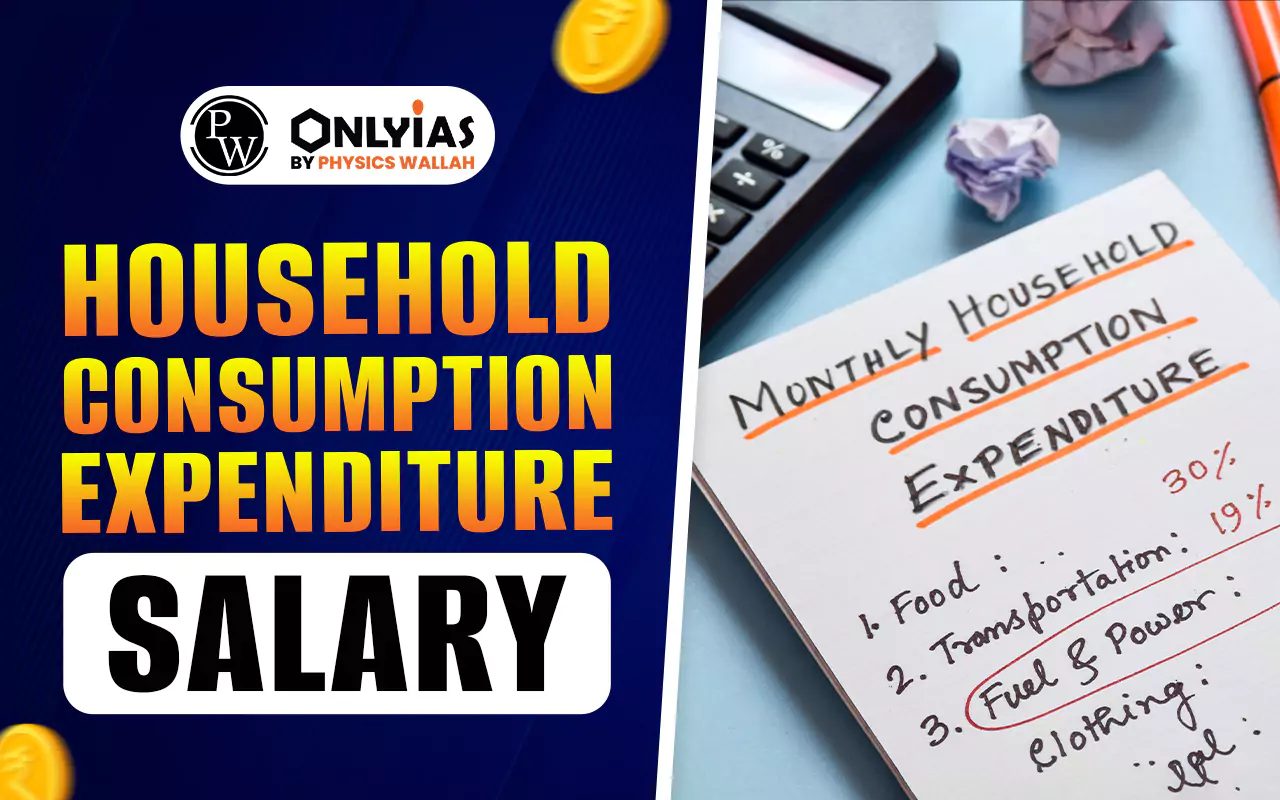Household Consumption Expenditure Survey 2023–24 by MoSPI highlights declining inequality and rising rural MPCE; Household Consumption Expenditure Survey data helps in welfare schemes, CPI and poverty analysis.

Household Consumption Expenditure Survey (HCES) is a critical statistical exercise that captures the expenditure pattern of Indian households across rural and urban settings. Conducted by the Ministry of Statistics and Programme Implementation (MoSPI) through its National Sample Survey Office (NSSO), this survey provides data essential for understanding living standards, updating the Consumer Price Index (CPI), and informing policies related to poverty alleviation and welfare schemes.
Following the disruptions caused by the COVID-19 pandemic, MoSPI initiated two consecutive rounds of the Household Consumption Expenditure Survey, one during August 2022–July 2023 and another from August 2023–July 2024. The summary findings of the second round (HCES:2023–24) were released in June 2024 and are available on the official MoSPI website.
The household consumption expenditure survey is a large-scale, periodic survey conducted by the National Sample Survey Office (NSSO) under the MoSPI. It is designed to collect detailed information on the spending behaviour of households on various goods and services, ranging from food, clothing, and housing to education, healthcare, and transport.
The HCES full form is Household Consumption Expenditure Survey. It plays a crucial role in:
The household consumption expenditure survey is conducted by the Ministry of Statistics and Programme Implementation (MoSPI) through the National Sample Survey Office (NSSO). This survey is typically conducted every few years and forms the backbone of socio-economic planning and monitoring.
Post-COVID, MoSPI initiated two consecutive household consumption expenditure surveys. The first was conducted from August 2022 to July 2023, and the second from August 2023 to July 2024.
Both surveys covered all States and Union Territories, offering a panoramic view of India’s socio-economic fabric.
The HCES 2023–24 surveyed 2,61,953 households—1,54,357 rural and 1,07,596 urban—across all Indian States and Union Territories. Like the 2022–23 survey, two sets of Monthly Per Capita Consumption Expenditure (MPCE) estimates were generated:
These estimates are published in Section A and Section B, respectively, of the HCES report.
The Household Consumption Expenditure Survey 2023–24 provides valuable insights into the changing consumption behaviour of Indian households. It captures expenditure patterns, food versus non-food spending, rural-urban disparities, and regional variations. The findings help understand socio-economic progress, assess the impact of welfare schemes, and support evidence-based policymaking.
Below are the most important highlights from the HCES 2023–24:
The average MPCE for 2023–24 (excluding free items under welfare schemes):
With imputation (including free welfare scheme items):
This reflects a significant increase from 2022–23 levels, indicating enhanced purchasing power, especially in rural areas.
The urban-rural MPCE gap:
This trend signifies improving rural living standards and reduced economic disparity.
In rural areas:
In urban areas:
Major food expenditures include:
Key non-food expenses:
This shift towards non-food items reflects socio-economic progress and lifestyle changes.
Measured by the Gini coefficient, consumption inequality has decreased:
This marks an improvement in equitable resource distribution.
Highest MPCE:
Lowest MPCE:
States like Kerala, Punjab, and Andhra Pradesh show narrow urban-rural MPCE differences, signaling balanced development.
Significant findings among population segments:
Notably, the lowest-income groups experienced the highest growth in MPCE—22% in rural and 19% in urban areas—from 2022–23.
The latest survey expanded its item list from 347 to 405, adding:
This reflects modern consumption trends in both rural and urban India.
MoSPI also released a companion report—‘Nutritional Intake in India’, estimating per capita and per consumer unit consumption of calories, protein, and fat:
Nutrient intake correlates positively with MPCE across all segments.
Items like food grains, clothing, school uniforms, and digital devices received free of cost under government schemes were valued and imputed in the survey. However, services under PM-JAY and similar health schemes were excluded from imputation due to lack of transaction data.
The household consumption expenditure survey plays a foundational role in Indian policymaking:
The Household Consumption Expenditure Survey 2023–24 offers a modern and granular view of Indian household consumption trends. It highlights increasing rural expenditure, narrowing urban-rural gaps, and a shift in spending patterns towards non-food items. As India moves towards Viksit Bharat, the insights from HCES become indispensable for shaping inclusive and evidence-based development policies.
For aspirants of competitive exams such as UPSC, understanding the findings and methodology of the household consumption expenditure survey is crucial. It offers rich insights into the economic behaviour of Indian households, guiding not only policy but also academic and administrative discourse.
Ready to boost your UPSC 2025 preparation? Join PW’s UPSC online courses today!
It helps track household spending and supports updating the Consumer Price Index (CPI) and poverty estimation.
HCES full form is Household Consumption Expenditure Survey, conducted by NSSO under MoSPI.
The Ministry of Statistics and Programme Implementation (MoSPI) conducts this survey via the NSSO.
It is conducted periodically; post-COVID, two rounds were held in 2022–23 and 2023–24.
The 2023–24 data shows a narrowing urban-rural MPCE gap, indicating faster rural consumption growth.
MPCE (Monthly Per Capita Consumption Expenditure) is the key indicator to assess economic well-being and inequality.
<div class="new-fform">
</div>